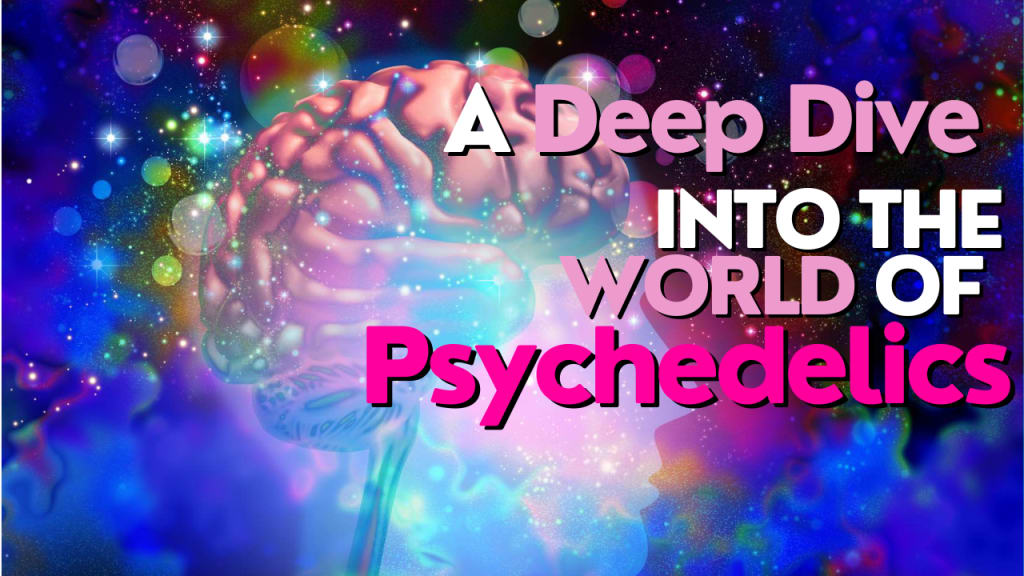How Psychedelics Impact the Mind and Brain: A Journey into Altered States of Consciousness
The world of altered minds

Watch "Unlocking the Mind: A Psychedelic Journey" to get a better insight on the history of psychedelics: https://youtu.be/l6MLsWLL4Pg?si=OP6gmQAoknMhK5Bc
In the 1960s, psychedelics like LSD gained popularity among the counterculture movement, particularly with the hippies. However, due to concerns about their potential dangers, LSD and other psychedelics were declared Schedule I substances in 1970, making them illegal for recreational, medical, and research use in the United States. Despite their controversial status, there has been a resurgence of interest in studying the therapeutic potential of psychedelics in recent years. Substances like psilocybin, found in magic mushrooms, have shown promising results in treating mental health disorders such as anxiety, depression, and addiction.
Exploring LSD: A Powerful Psychedelic
LSD, also known as "acid," is a powerful psychedelic substance that can profoundly alter one's perception of the world. It can impact mood, senses, and attention, often leading to hallucinations and changes in sensory experiences. LSD is classified as a classic hallucinogen, along with substances like psilocybin, ayahuasca, and mescaline. These mind-altering substances are believed to primarily affect the brain's serotonin system, which plays a crucial role in regulating emotions, satisfaction, happiness, and optimism.
Effects of LSD on Perception and Mood
When someone takes LSD, they may experience a range of effects, including:
Altered sense of time, with a feeling of time slowing down or speeding up.
Changes in perception, such as seeing colors and objects that aren't real, or distortions in the size and shapes of objects.
Heightened sensitivity to sounds and movements.
Feelings of happiness and euphoria.
Delusions, where individuals may believe things that aren't true.
Physical Appearance of LSD
In its pure form, LSD is a white, odorless liquid with a slightly bitter taste. However, it is more commonly found dried onto blotting paper, which is divided into small squares and often decorated with designs like smiley faces. It can also be sold in tablets, capsules, or dissolved into liquid form. On the streets and in popular culture, LSD goes by various names, including acid, tabs, microdots, dots, window panes, or mellow yellow.
The Growing Interest in LSD Research
In recent years, there has been a renewed focus on studying LSD as a potential treatment for mental health disorders and addiction. Research has shown that LSD can increase connectivity between different brain regions that are typically less connected. This effect can lead to enhanced creativity, imagination, and insights, which may have therapeutic benefits.
One study involving patients with anxiety associated with life-threatening diseases found that anxiety was significantly reduced for up to two months following two doses of LSD. In a follow-up study after one year, participants consistently reported feeling less anxious, freer, and an increased sense of well-being. Clinical trial participants have also reported improved emotional access, better ability to confront anxieties, blissful states, heightened empathy, and openness to new ideas.
While the positive outcomes of LSD-assisted psychotherapy are encouraging, it's important to note that LSD can also reduce the ability to identify sad and fearful faces and complex emotions. Despite the limited research, the potential benefits of LSD have led to a growing number of individuals using psychedelics outside of clinical settings, highlighting the need for further research.
The Legal Status of LSD
Currently, LSD remains illegal in the United States, with limited opportunities for scientific trials due to federal regulations. However, research on LSD was conducted in the 1950s to 1970s, exploring its potential as a treatment for anxiety, depression, psychosomatic diseases, and addiction. Encouraging results were obtained from clinical trials conducted at the Maryland Psychiatric Research Center in Baltimore, where 700 patients were treated for anxiety and depression. In recent years, clinical research with LSD has resumed in Europe, particularly in Switzerland and the United Kingdom, allowing for further exploration of its therapeutic potential and insights into brain functioning.
Potential Therapeutic Applications of LSD
Although there have been limited studies on LSD in recent decades, the existing research suggests that it may have potential therapeutic applications. One review of rigorous research found evidence supporting the use of LSD as a treatment for alcohol use disorder. Additionally, a few single doses of LSD have shown promise in reducing anxiety related to severe illness, depression, and addiction. Long-lasting reductions in anxiety and depression symptoms have been reported for up to 16 weeks following LSD administration. However, further research is necessary to confirm these outcomes and fully understand the potential of LSD in psychiatric treatment.
The Rise of Microdosing
Microdosing refers to the practice of taking very small amounts of a psychedelic substance, such as LSD. While a recreational dose of LSD typically ranges from 100 to 200 micrograms, a microdose is typically between 10 and 20 micrograms. Recent studies conducted in Europe have reported positive effects of LSD microdosing on mood, creativity, thinking, anxiety reduction, increased energy, and friendliness. Some studies have even observed changes in blood markers related to neuroplasticity, which is crucial for treating depression.
It's important to note that some researchers have found similar positive outcomes in individuals who were given placebos, suggesting that the perceived benefits of microdosing may be influenced by beliefs rather than the actual substance. Nonetheless, the promising early results of microdosing warrant further research to explore its potential benefits.
Understanding the Risks of LSD Use
As with any substance, there are risks associated with LSD use. These include the possibility of having a "bad trip," which can involve extreme anxiety, sadness, confusion, and unpredictable behavior. It is important to note that the setting in which LSD is taken plays a significant role in the overall experience.
Taking a large dose of LSD can lead to panic, fear, and an increased risk of harm. Individuals may become frightened by their surroundings and the people around them. In severe cases, it may be necessary to seek medical assistance. Other potential risks include experiencing flashbacks, moderate increases in blood pressure and heart rate, and the unpredictable reactions that can occur when LSD is combined with other substances.
It's worth noting that LSD does not cause physical dependence or withdrawal symptoms. However, tolerance to the effects of LSD can develop, requiring higher doses to achieve the same level of effect.
Concerns for Parents: Addressing LSD Use
If you suspect that your child is using LSD or any other substance, open and honest communication is crucial. Approach the conversation with empathy and understanding, expressing your concerns and offering support. It's important to remember that substances sold as LSD may contain unknown ingredients, increasing the potential risks.
While it is advisable to promote abstinence from drug use, if your loved one insists on using LSD, there are measures to reduce potential harm. Encourage them to follow harm reduction strategies such as using substances from reliable sources, planning their experiences in a safe environment, and taking only the intended amount. Emphasize the importance of staying hydrated, avoiding mixing substances, and leaving sufficient time between trips to process the experience.
Conclusion
The resurgence of interest in studying psychedelics like LSD reflects the growing recognition of their therapeutic potential. While LSD remains illegal in many jurisdictions, research suggests that it may have promising applications in treating mental health disorders and addiction. However, further research is needed to fully understand the therapeutic benefits, risks, and optimal usage guidelines for LSD. As the research continues, it is crucial to approach discussions about LSD use with open-mindedness, empathy, and a focus on harm reduction.
By embarking on this journey into altered states of consciousness, researchers and individuals alike hope to unlock the potential of psychedelics for the betterment of mental health and well-being.
For a summary of Psychedelics watch "Unlocking the Mind: A Psychedelic Journey": https://youtu.be/l6MLsWLL4Pg?si=E-b73cxT-XsXhOYw
About the Creator
Enjoyed the story? Support the Creator.
Subscribe for free to receive all their stories in your feed. You could also pledge your support or give them a one-off tip, letting them know you appreciate their work.





Comments
There are no comments for this story
Be the first to respond and start the conversation.